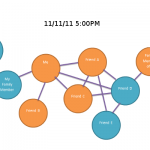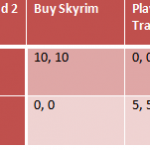Skyrim and Steam: An Efficient Cascade
Bethesda Softworks produces several highly popular single player role playing games. The success of their last generation of games has prompted a great deal of hype for their newest release: Elder Scrolls V: Skyrim. Much of the sales of this title were made over an online social networking and videogame sales service – “Steam”.
I have been playing Bethesda games since 2003 and have been a devoted fan of their RPG titles – so naturally I pre-ordered Skyrim expecting another thrilling game. Somewhat to my surprise I was not the only one of my friends who was excited. The hype surrounding this release became fairly pronounced after Bethesda released a trailer showcasing the game’s sophistication. This hype laid the groundwork for a massive hit.
When Skyrim was released on 11/11/11 I excitedly began playing it with one of my friends. During gameplay I occasionally saw updates on his gameplay though my Steam Client. Interestingly, one of my unrelated friends began playing the game as well, and his status updated to “Playing Skyrim”. I decided to tell a mutual friend about this discovery and this made him curious, even though he did not usually play role playing games. Within an hour of hearing the gameplay reactions of two of his friends, he proceeded to purchase Skyrim.
Three days later – I discovered that my two other friends – not as close – were in the process of purchasing their own copies after hearing about it from siblings and classmates – it was clear that my own network of “strongly connected” friends had become saturated with the Skyrim phenomenon, and in turn were beginning to pass interest in the game to their strong ties. (See below for a photo of the timeline of the progression of the game’s sales through my network).
What’s interesting is that even though Skyrim is a single-player game, it plays in a style that encourages cooperation and rivalry. I had to ask my friends many times how to accomplish certain feats in the game – and without them, my experience would have been much worse (stuck at a puzzle in the early-game). Likewise, much of the joy comes from comparing trophy items collected in the game with one’s friends. Clearly there is a difference of payoff that comes from playing the game with one’s friends vs. playing the game alone. (See attached for a sketch of these payoffs).
Skyrim acted as an information cascade. My two friends and I are diehard fans of Bethesda’s games so we preordered the game and started playing at midnight of the release day. We had no idea if the game would be good or not. “Friend C” became 2/3 surrounded by his strongly connected friends who were playing Skyrim and he proceeded to make the purchase in hopes of a better payoff. The next day, “Friend D” – a weakly connected friend to me – was considering making the purchase; however it was not until one of his family members made the purchase that he decided to do so. Friend E made the purchase almost as soon as he heard D was going to buy it. I’m not well connected enough to Friend D or E to know if any of their strong ties decided to purchase the game. My relative did not buy the game since she doesn’t know enough other Skyrim players for changing games to be more valuable than playing a traditional game yet.
It makes me happy to know so many of my friends appreciate the same kind of game that I do. We have become far more competitive about our gameplay experience, and it’s much less frustrating whenever one of us gets stuck in the game since the rest can offer advice. The purchase has been very rewarding.


